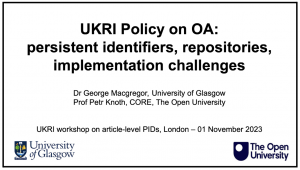News Story
CORE presents at UKRI workshop on research article PIDs and their role in the UKRI OA policy
Friday 17 Nov 2023
In November, there was a whole-day workshop held at the headquarters of United Kingdom Research and Innovation (UKRI) in London on the topic of article-level persistent identifiers (PIDs) in the context of the UKRI OA Policy. There were representatives from HEIs, UKRI, and scholarly services providers, including Crossref and Cosector (host repositories). Professor Petr Knoth, together with Dr George Macgregor from the University of Glasgow, gave a presentation on the use of article-level identifiers in repositories.
To be considered compliant with UKRI’s open access requirements, research articles made available via repositories are required to be associated with article- level identifiers. The objective of the workshop was to discuss the options available to repositories in meeting that requirement.
The presenters demonstrated the benefits of having identifiers for repository records that resolve directly to the landing pages in repositories rather than to the publisher’s website and discussed the challenges in meeting this requirement. They then demonstrated that OAI identifiers constitute a practical solution that meets the UKRI requirements. Overall, there are several requirements for repository record identifiers:
- Dereferencing to the repository: An identifier should resolve (dereference) to the splash page of the resource in a given repository.
- Identifier of the repository record rather than of the scholarly work: ability to identify metadata only and metadata with research outputs records.
- High adoption rate: needs to be widely adopted across the network of repositories so that all repository records could be uniquely identified.
OAI identifiers were created by the Open Archives Initiative over 20 years ago as part of the OAI-PMH protocol and are universally adopted across repositories. In CORE, 100% of records have an OAI identifier. As these identifiers can be configured to resolve by default to repositories rather than to publishers, this approach has the potential to increase the importance of repositories in the process of disseminating knowledge. OAI identifiers identify records in repositories and thus complement the DOI system, providing the ability to link repository records to objects identified by a DOI, e.g. the Version of Record of a manuscript on a publishers website (especially for multi-author, multi-institution deposits).
The strength of the OAI solution is that it constitutes a cost-free, decentralised mechanism for minting PIDs which is already universally adopted and it is therefore perhaps the easiest way to enable repositories to satisfy the article-level PIDs requirement set by the UKRI OA Policy.
CORE works with over 12,000 data providers (repositories) and, via the CORE Dashboard, provides the ability for repositories to map their OAI prefix to the repository URL, thus ensuring that the OAI-Id links directly to the article landing page in the hosting repository. Further, CORE delivers a free OAI resolver that provides a mechanism for resolving these identifiers to repository landing pages.
Dr George Macgregor stated;
“A plurality of solutions is necessary to deliver the PID-based ecosystem UKRI are trying to encourage. And as we discussed at the workshop, there are circumstances in which several PID types may usefully co-exist or, within specific communities of practice, be completely necessary. OAI IDs are an exciting contribution to this plurality, while also complementing other identifier schemes and providing a low-barrier persistence solution for some research organisations”
Professor Petr Knoth added;
“OAI IDs offer a decentralised and cost-free solution to minting PIDs for repository records. OAI IDs are a natural solution for repositories as they have already been universally adopted, retain control of article-level PIDs inside repositories and resolve to the repository landing page, rather than to publishers’ websites. This ensures repositories remain central in the scholarly dissemination process and guards against the danger of a PIDs vendor lock-in, i.e. a situation in which a repository has no other option but to work with a single entity and pay them for the registration of its own research assets.”
Latest News
The Open University at The Royal Society Summer Science Exhibition 2019
OU Vice-Chancellor visits KMi: A showcase of Innovation and Impact
Explainable AI study on Education Equity awarded Best Paper at ICAITE 2025
ClimateSense team wins top places in two international misinformation challenges
Assessing the Impact of Artificial Intelligence on the Gender Pay Gap

